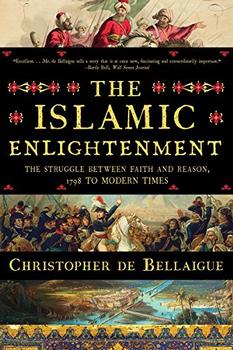Summary | Excerpt | Reviews | Beyond the Book | Read-Alikes | Genres & Themes | Author Bio

The Struggle Between Faith and Reason, 1798 to Modern Times
by Christopher de BellaigueThis article relates to The Islamic Enlightenment
The Turkish author and activist Halide Edib (also sometimes spelled as Edip) Adivar is one of the influential women highlighted by de Bellaigue in The Islamic Enlightenment, for her literary talent as well as her ardent nationalist allegiance. She published two memoirs and 19 novels, and was an outspoken voice of support for women's rights and Turkish independence.
 Edib was born in Istanbul in 1882 and educated at Istanbul's American Girls College at a time when most girls did not attend school. After graduating, she married a mathematics professor from the school, and had two sons with him before they divorced in 1910. She worked as a journalist and published her first two novels in 1909-1910. In 1911 she traveled to London, where she wrote The New Turan, a utopian vision of a Pan-Turkish national identity. This work earned her the moniker, "mother of the Turks." Edib married again in 1917. Her second husband, Abdülhak Adnan Adıvar, was a fellow intellectual and activist.
Edib was born in Istanbul in 1882 and educated at Istanbul's American Girls College at a time when most girls did not attend school. After graduating, she married a mathematics professor from the school, and had two sons with him before they divorced in 1910. She worked as a journalist and published her first two novels in 1909-1910. In 1911 she traveled to London, where she wrote The New Turan, a utopian vision of a Pan-Turkish national identity. This work earned her the moniker, "mother of the Turks." Edib married again in 1917. Her second husband, Abdülhak Adnan Adıvar, was a fellow intellectual and activist.
In 1919, Edib gained renown for a speech she delivered at the dawn of the Turkish War of Independence, when the Greek army came to occupy Izmir. She spoke encouragingly to the crowd of a brighter future, declaring "The Turk and the Muslims are now experiencing their darkest day. Night, a dark night. But there is no night without morning in life." The speech also contained a pithy phrase that Edib recycled for use in her novel, The Daughter of Smyrna: "Nations are our friends. Governments are our enemies."
During the war, later known as The Turkish War of Independence, Edib worked as a nurse and her nationalist spirit was further bolstered by witnessing the courage and selflessness of the soldiers. She wrote about the war in her second memoir, The Turkish Ordeal, published in 1928. The war dissolved the Ottoman Empire and created the nation of Turkey, and Edib and associates formed the Progressive Republican Party as an opposition party to the rule of President Mustafa Kemal Atatürk. After the banning of the party by Atatürk, Edib and Adivar moved to Europe for several years. Edib returned to teach literature at Istanbul University in 1939. She retired in 1950, but continued writing until her death in 1964.
Edib's novels are celebrated for their insight into the social issues of the time, and their strong female characters. She was an admirer and expert on 18th century English literature and her novels reflect that affinity in tone, plot structure, political commentary, and narrative point-of-view, which is typically third-person omniscient. In addition to those already mentioned, Edib is extolled for her 1935 novel, The Clown and His Daughter, set in the waning years of the Ottoman Empire.
Picture of Halide Edib Adivar from Bilgihanem.com
Filed under People, Eras & Events
![]() This "beyond the book article" relates to The Islamic Enlightenment. It originally ran in May 2017 and has been updated for the
August 2018 paperback edition.
Go to magazine.
This "beyond the book article" relates to The Islamic Enlightenment. It originally ran in May 2017 and has been updated for the
August 2018 paperback edition.
Go to magazine.
The moment we persuade a child, any child, to cross that threshold into a library, we've changed their lives ...
Click Here to find out who said this, as well as discovering other famous literary quotes!
Your guide toexceptional books
BookBrowse seeks out and recommends the best in contemporary fiction and nonfiction—books that not only engage and entertain but also deepen our understanding of ourselves and the world around us.